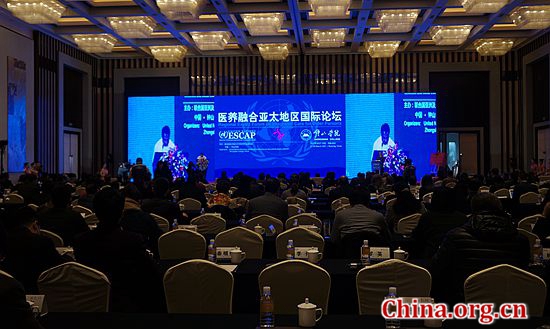|

|
| UN Economic and Social Commission for Asia and the Pacific (ESCAP) and Zhongshan College based in China’s Nanjing City hold a Regional Expert Forum on Integrated Care for Older on March 17, 2017, with an aim to enhance the access of older persons to services in China, including health and long-term care services. [Xu Lin/China.org.cn] |
The UN Economic and Social Commission for Asia and the Pacific (ESCAP), in cooperation with Zhongshan College based in Nanjing City, launched a forum on Friday aiming to help older people gain better access to health and long-term care services in China.
The three-day Regional Expert Forum on Integrated Care for Older People is organized within the framework of a project entitled “strengthening national capacity for promoting and protecting the rights of elders.” It particularly focuses on the provision and financing of long-term care.
Dr. Nagesh Kumar, director of ESCAP’s Social Development Division, said population ageing was bow a major problem facing the whole world, and one of the key challenges in achieving the 2030 Agenda on Sustainable Development.
The number of older persons in the region is expected to almost triple from 514 million in 2015 to more than 1.31 billion by 2050. By then, one in four people will be over 60 years of age, out of which number those over 80 year will constitute about one-fifth.
This demographic phenomenon will have a profound impact on the wellbeing of all generations. Older persons are among the groups most likely to be left behind if no adequate policies are adopted. Increasing numbers of elderly will require long-term care, and it is increasingly difficult for their needs to be met by family care alone.
Therefore, Kumar said, population ageing requires innovative policies, especially to address the increasing demand for healthcare services. Using Information and Communication Technologies is one possible approach to increase healthcare access .
One good thing was that the expanding care sector can become a growth sector and a sector driving employment opportunities. “If we train people adequately to provide care for older persons, we can achieve two goals: we increase the quality of care that older persons receive and we increase the potential for them to find decent jobs in the care sector.”
At the forum, Zhongshan College was appointed as the INIA (International Institute on Ageing) Zhongshan Satellite Center by the United Nations. Chen Yi, Chairman of Board of Zhongshan College, told China.org.cn that the college is working on the project of Human Resource Development Center for Elderly, featuring a student internship base, a rehabilitation hospital, a nursing home, a training center and a research center of ageing development. The college has provided training in elderly care for more than 15,000 persons so far.
China now has less than 300,000 paramedics, and only 40,000 have qualification certificates, said Professor Jiang Fuxin, president of Zhongshan College. Based on the international standard, China needs a total of 10 million paramedics.
To fill in the gap, the college is offering eight majors of elderly service and management, community-based rehabilitation, community management and service, rehabilitation treatment technology and nursing, etc. A major of rehabilitative engineering technology will be introduced within this year.
Officials, experts, scholars and entrepreneurs from 21 Asia-Pacific countries and regions attended the forum.


